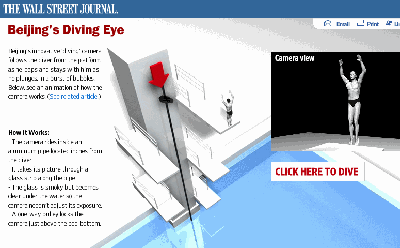Topic: TV - on August 15, 2008 at 2:30:00 PM CEST
Low-Tech Camera Uses No-Tech Gravity to Drop Viewers Into the Pool
High-tech televisual bells and whistles have carried couch-based Olympic watching way beyond the mere reality of being here. Thousands of cameras are catching the action in China -- every one of them high-definition. Yet for a feat of engineering magic that dazzles as it baffles, nothing beats the DiveCam.
On TV, a diver walks out onto a platform. The camera fixes on him. He waits. He leaps. And then -- somehow -- the camera stays with him as he plunges. In the instant it takes him to break the water's surface, the picture suddenly cuts to an underwater shot -- and we watch in disbelief as the dive culminates in a burst of bubbles.

... Link (0 comments) ... Comment
Topic: NASA - on August 15, 2008 at 1:07:00 PM CEST
Russian push into Georgia could knock Nasa off ISS
Russia’s invasion of Georgia is sending ripples right out into space, with NASA facing the possibility of no longer being able to hitch a ride to the International Space Station on Soyuz flights.
With the space shuttle due to retire in 2010, and the US not likely to have a replacement manned space flight option ready till 2015, Russian’s space fleet is the only interim option for the US to get people into space and onto the ISS.
... Link (0 comments) ... Comment
Topic: WAR - on August 15, 2008 at 1:06:00 PM CEST
US says the next war will be all in our minds
The US needs to draft in psychopharmacologists, neuroscientists and even goateed cultural studies experts to fight 21 century wars that will be largely in the mind.
A report commissioned by the Defense Intelligence Agency on Emerging Cognitive Neuroscience and Related Technologies predicts a freakish future of advances in neurosciences, and that the US will forget about the battle for the hearts and head straight for the mind.
... Link (0 comments) ... Comment
Topic: COMPUTER - on August 15, 2008 at 1:02:00 PM CEST
Ruling Is a Victory for Supporters of Free Software
A legal dispute involving model railroad hobbyists has resulted in a major courtroom victory for the free software movement also known as open-source software. Skip to next paragraph
In a ruling Wednesday, the federal appeals court in Washington said that just because a software programmer gave his work away did not mean it could not be protected.
The decision legitimizes the use of commercial contracts for the distribution of computer software and digital artistic works for the public good. The court ruling also bolsters the open-source movement by easing the concerns of large organizations about relying on free software from hobbyists and hackers who have freely contributed time and energy without pay.
... Link (0 comments) ... Comment










